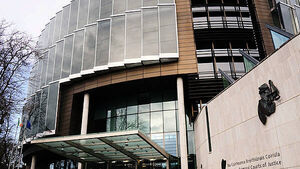Man (41) found guilty of stabbing brother to death after a funeral

David Raleigh
A man was found guilty of stabbing his brother to death following a family funeral last year.
Fergus O’Connor, (41), Scartaglen, Castleisland, Co Kerry, who denied the murder of his brother, Paudie O’Connor, (42), will be sentenced before Christmas.
Paudie O’Connor suffered a 17cm stab wound that pierced his chest, heart, and liver. He died at the scene.
A jury at the Central Criminal Court, sitting in Limerick, reached an 11-1 majority decision that Fergus O’Connor was guilty of murdering his brother, after it deliberated for a total of six hours and 48 minutes.
The jury heard evidence in a seven-day trial that the two brothers were seen drinking together in a pub in Kerry after they attended the funeral of a cousin on June 27th, 2024.
The trial heard Fergus O’Connor told gardaí following his arrest that Paudie came at him with a knife and that he acted in self defence in the early hours of the next morning on June 28th.
Fergus also told gardaí that Paudie struck him with a fist a number of times and that he retaliated by elbowing Paudie in the face.
Assistant State pathologist, Dr Margaret Bolster, gave evidence at the trial of having completed a report on her having conducted a post mortem on Paudie O’Connor’s body.
Dr Bolster told the court Paudie died from a single stab wound that penetrated his chest, and nicked one of his ribs, penetrated right through the right ventricle of his heart, and into his liver.
The forensic pathologist told the court the entire stab wound was “17cm in length”.
Dr Bolster said that it appeared from bloodstained footprints found at the scene that Paudie walked down a stairs at their home following the alleged attack and that he would have collapsed and died “quickly” from the stab wound.
She said the results of toxicology tests she performed on the victim’s blood, at autopsy, showed that the level of alcohol in his blood blood was the equivalent of him being more than five times over the legal limit for driving.
Fergus O’Connor was also highly intoxicated and not fit to be questioned after he was arrested by Gardaí, a locum doctor, who had examined him at the Garda station, told the trial.
Paudie’s death was due to Hemopericardium after 250mls of his blood filled his pericardial sac (sac around the heart), which in turn put pressure on his heart and its ability to pump blood, the trial heard.
“The person goes into shock and dies,” said Dr Bolster
There were no other significant injuries to the body, bar a number of “superficial” insignificant bruises and grazes.
Dr Bolster agreed with prosecuting senior counsel, Michael Delaney, assisted by Tom Rice BL, and instructed by the State Solicitor’s Office, Co Kerry, that her notes of the death scene were that Paudie O’Connor’s body was “lying on its back, covered by blankets, both arms were in a spreadeagled position, the legs were extended, and the body was heavily bloodstained”.
“A stab wound could be seen on the left of the thorax, the entire body was heavily bloodstained, including the soles of (Paudie’s) feet. Blood was also present inside the house,” Ms Bolster noted.
“The body was heavily blood-smeared, including the face, the thorax of the chest, both lower limbs and feet.”
There were no defensive wounds on the body, she added.
A GP attached to Southdoc gave evidence of attending Tralee Garda Station to examine Fergus O’Connor following his arrest, to certify if he was fit for questioning, but he was not.
The trial heard Fergus was covered in blood when he arrived at the Garda station. He was extremely anxious and intoxicated, it was heard.
Fergus’s barrister, senior counsel Mark Nicholas, defending with barrister Caroline O’Connell, instructed by Eimear Griffin, Padraig O’Connell Solicitors, Killarney, noted in court that when the blood was cleaned from Fergus O’Connor’s face at the garda station it revealed what appeared to be an injury “above his eye, on his forehead”.
Gardaí told the court they found two knives near the scene, including one in a ditch and one in a drain on the road but both were described as weather beaten blades.





